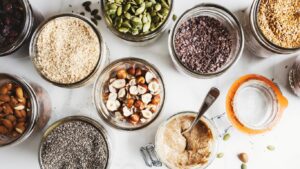Dysmenorrhea, another name for menstrual discomfort, is a prevalent condition that affects women all over the world. Menstrual cramps and pain can frequently cause severe discomfort and interfere with regular activities. Even though over-the-counter painkillers are frequently used, many women are looking for all-natural ways to reduce menstrual discomfort. Read on to not only understand menstrual pain in a bit more detail but also some of the natural remedies that women can incorporate into their lives to relieve symptoms of menstrual pain and enhance general health during menstruation.
Get To Know Menstrual Pain
From slight discomfort to intense cramps, menstrual pain can range in intensity and length. Uterine contractions that aid in uterine lining expulsion frequently result in this pain. The intensity of menstruation pain is influenced by inflammation, prostaglandin production, and hormonal abnormalities. Natural treatments encourage holistic recovery and lessen reliance on medication by providing an alternative to pharmaceutical medications.
Natural Remedies for Menstrual Pain
Let’s explore more and see which natural remedies can work for reducing menstrual pain.
Alterations in Diet
Menstrual pain can be significantly reduced by changing one’s diet. You can lessen pain and inflammation in your body by eating the items listed below:
- Omega-3 Fatty Acids: Foods high in omega-3 fatty acids, such as flaxseeds, walnuts, and fatty fish (salmon, sardines), can aid to reduce inflammation and ease pain. According to research in the Journal of Reproductive Medicine, menstruation discomfort and inflammation were significantly reduced in women who had an omega-3-rich diet.
- Fruits and veggies: Consuming more fruits, veggies, and whole grains increases your intake of vital nutrients and promotes your general health.
- Coffee and Processed Meals: It’s best to cut back on coffee, alcohol, and processed meals to balance hormones and lessen menstruation discomfort.
Magnesium supplements
A mineral called magnesium is well known for its ability to relax the muscles. According to studies, taking a magnesium supplement may ease menstruation pain by easing muscular contractions. You may be able to ease menstruation discomfort by increasing your intake of magnesium-rich foods including leafy greens, nuts, seeds, and whole grains, as well as by taking magnesium supplements.
Herbal supplements
Due to their ability to lessen menstruation pain, several herbal supplements have become increasingly popular. Here are a few illustrations:
Ginger: During menstruation, ginger tea or ginger capsules might relieve cramps and inflammation.
Turmeric: When taken as a supplement or added to food, turmeric’s anti-inflammatory effects may provide relief.
Natural Calming Brews: Herbal Teas
For generations, people have utilized specific herbal teas to reduce menstrual discomfort and have relaxing effects. Here are several possibilities:
Chamomile tea: Known for its ability to fight inflammation, chamomile tea helps ease pain and lessen muscular spasms.
Peppermint Tea: Popular for its ability to relax the muscles, peppermint tea helps to relieve cramps.
Raspberry Leaf Tea: This well-liked remedy helps tone the uterus and lessen menstrual pain.
Aromatherapy using Essential Oils
Menstrual pain reduction can be achieved naturally and comfortably with the use of essential oils in aromatherapy. The relaxing effects of the following oils can soothe the body and ease cramps:
Lavender: Known for its calming effects, lavender oil can be incorporated into the routine by adding it to a warm bath or gently massaging over the lower belly for best results.
Clary sage: Historically, this oil has been used to ease menstrual discomfort. To encourage relaxation, diffused clary sage oil in the room can work, or apply diluted clary sage oil on the lower belly.
Marjoram: Thanks to its analgesic and antispasmodic effects, marjoram oil can ease cramps and uplift the spirit.
Stretching and Exercise
Menstrual pain can be decreased by regularly exercising and gently stretching. Endorphins, which are naturally occurring painkillers that help elevate mood and lessen discomfort, are released when you exercise. Walking, swimming, or cycling are examples of simple aerobic exercises that can enhance blood flow to the pelvic area and relieve cramps and pain.
Rest and Sleep
Rest and sleep are essential for overall health, particularly during menstruation. Hormonal changes and discomfort might interfere with sleep. To lessen menstrual pain, prioritize getting a good night’s sleep and give yourself time to unwind throughout the day. Establish a calm evening ritual, keep a cozy sleeping environment, and pay attention to your body’s demand for sleep.
Mind-Body Techniques
Incorporating mind-body practices into your routine can be beneficial because stress can make menstrual pain worse. Deep breathing exercises, meditation, yoga, and mindfulness techniques can help the body and mind unwind, lowering stress levels and alleviating menstrual cramps. These methods help enhance general health and emotional stability, which has a favorable effect on menstrual pain management.
Heat Therapy: Relieving Comfort
Heat therapy is among the easiest and most powerful natural treatments for menstruation discomfort. Warmth in the abdomen region eases the uterine muscles and lessens cramping. Warm baths, heating pads, or hot water bottles can all offer soothing relief. Heat therapy stimulates blood flow, which encourages relaxation and reduces discomfort.
Acupuncture
In this traditional Chinese medicine procedure Acupuncture, thin needles are used that are inserted into specific body spots. This method lessens menstruation discomfort by promoting hormonal balance and enhancing energy flow. It is thought that acupuncture is a secure and reliable all-natural treatment for menstruation discomfort because it has demonstrated good outcomes in numerous research studies. For best outcomes, it is advised to speak with a qualified acupuncturist with expertise in women’s health.
Acupressure
Acupressure targets particular spots on the body to promote healing, much like acupuncture. Some acupressure sites, including those on the inner ankle, lower back, and lower belly, can be gently pressed to ease menstrual discomfort. By releasing tension and promoting the flow of energy, this approach offers unforced comfort. Qualified professional or self-applying acupressure techniques are both acceptable.
Although menstrual pain can be difficult, several natural therapies can help to reduce discomfort and enhance well-being. Prioritize self-care and listen to your body for getting the maximum benefits from natural therapies. Some of the natural remedies include heat therapy, herbal teas, dietary changes, and exercise, as well as essential oils, acupuncture, and mind-body practices. However, it’s crucial to keep in mind that every woman’s experience with menstruation pain is different, so talking to a health practitioner before attempting any new treatments or starting supplements is recommended. You may take charge of your health by adopting natural therapies into your regimen. It’s important to consult a doctor if you have severe or ongoing menstruation discomfort because there may be underlying issues that need additional care.











